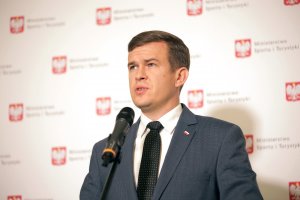Minister Witold Bańka is running for the presidency of the World Anti-Doping Agency
Minister Bańka: I intend to build unity within WADA, to strengthen the partnership between the governments and the sports movement and to look for compromises on issues most difficult for both sides
On 27 June 2018, at a press briefing, Minister Bańka confirmed that he plans to run for the Presidency of the World Anti-Doping Agency. The election to replace the current president is due to take place at the World Conference on Doping in Sport in Katowice in November 2019. Europe’s candidate for the position is likely to be recommended by the end of this year. Witold Bańka also presented the main objectives of his programme.
Strengthened anti-doping system
The media tend to focus their attention on large doping scandals. However, of much greater significance is the quality of anti-doping measures taken at the national level, emphasized minister Bańka. An analysis of data on anti-doping controls conducted in 2016 and of medal wins at the Olympic Games in Rio shows that nearly 10% of all medals won at the Games were won by athletes from countries which, in 2016, had either no anti-doping system at all, or tested less than 100 samples per year under their national anti-doping control programmes. Moreover, almost 50% of the countries whose national teams took part in the Rio Games had, at that time, no national anti-doping organization implementing adequate anti-doping control programmes.
The problem can be solved, according to the minister, by developing anti-doping capacities at the national level which should include, in particular, the establishment of a network of efficient and effective national anti-doping organizations. Minister Bańka indicated steps towards achieving this goal.
My proposal is to establish a separate funding mechanism, called Anti-Doping Solidarity Fund, to support capacity building at the national level, including the implementation of partnership programmes for countries with less developed anti-doping systems, he explained. Within such programmes, more developed national anti-doping organizations would help those with lower organizational capacities. The fund should closely cooperate with WADA, yet as a fully independent entity. It would be funded by voluntary contributions from sponsors, governments and sports organizations.
Athletes’ situation
The anti-doping system should operate to the benefit of athletes and not against them, he stressed. He also underlined the role of communication with athletes. The current anti-doping system is very complex and dominated by bureaucracy. For athletes, it is difficult to move within it. In many cases they are not provided even with the basic information on how the system works. Therefore, WADA at the global level, and national anti-doping organizations at the national level should focus their efforts on appropriate and tailor-made communication with athletes. It is the athletes for whom the anti-doping system has been established. Thus, any major changes within it, at any level, should be first consulted with athletes. They should also be provided with key information on what is happening in the anti-doping sector.
According to the minister, one of WADA’s main mistakes concerning the doping scandal in Russia was the failure to ensure proper communication, in particular with athletes. The results of the conducted investigations and corrective actions undertaken as a result of the crisis in Russia were not properly communicated to them. As a result, many of them lost trust in the system.
The Minister also referred to the need to engage athletes in anti-doping activities. Athletes should be engaged in anti-doping activities, including decision-making processes concerning issues of key importance to them. Only when they feel they a part of the anti-doping system will they be able to defend themselves, effectively and with full belief, against those that cheat in sport, he said. The minister proposed to establish an athletes committee within each national anti-doping organization, and to include athletes’ representations in governing bodies of those organizations. He also supported the idea of establishing a position of athletes ombudsman as an independent representative of the interests of athletes in WADA.
Anti-doping laboratories
Minister Bańka pointed out that most of the WADA-accredited anti-doping laboratories are located in Europe. There are huge differences between the continents in this respect. Therefore, it is my priority to establish more anti-doping laboratories around the world, with WADA’s active involvement in the process, he said.
Cooperation among all stakeholders
Only by working together can we make WADA really strong, concluded Minister Banka speaking of the need for all stakeholders to cooperate in the fight against doping in sport. Since its establishment, WADA has based its activities on the partnership between the governments and the sports movement. The organization was established because countries’ individual attempts to combat doping failed. The existing model of cooperation has proved to provide a very effective and stable platform for taking action. My goal is to build unity within WADA, to strengthen the partnership between the governments and the sports movement, and to look for compromises on issues most difficult for both sides, concluded minister Bańka at the end of the briefing.
